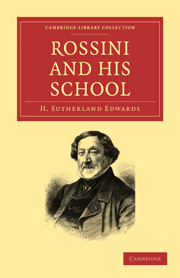Book contents
- Frontmatter
- Contents
- CHAP. I ROSSINI'S CHILDHOOD AND YOUTH
- CHAP. II LA PIETEA DEL PARAGONE
- CHAP. III ITALIAN OPERA UNTIL THE TIME OF ROSSINI
- CHAP. IV TANCREDI
- CHAP. V OPERATIC CUSTOMS IN ROSSINI'S TIME
- CHAP. VI ROSSINI AT NAPLES
- CHAP. VII PREPARATIONS FOR THE BARBER
- CHAP. VIII IL BARBIERE
- CHAP. IX ROSSINI AND THE COMIC IN MUSIC
- CHAP. X FROM OTELLO TO SEMIKAMIDE
- CHAP. XI ROSSINI ON HIS TRAVELS
- CHAP. XII DONIZETTI
- CHAP. XIII VERDI
- LIST OF ROSSINI'S PUBLISHED WORKS
CHAP. VIII - IL BARBIERE
Published online by Cambridge University Press: 29 August 2010
- Frontmatter
- Contents
- CHAP. I ROSSINI'S CHILDHOOD AND YOUTH
- CHAP. II LA PIETEA DEL PARAGONE
- CHAP. III ITALIAN OPERA UNTIL THE TIME OF ROSSINI
- CHAP. IV TANCREDI
- CHAP. V OPERATIC CUSTOMS IN ROSSINI'S TIME
- CHAP. VI ROSSINI AT NAPLES
- CHAP. VII PREPARATIONS FOR THE BARBER
- CHAP. VIII IL BARBIERE
- CHAP. IX ROSSINI AND THE COMIC IN MUSIC
- CHAP. X FROM OTELLO TO SEMIKAMIDE
- CHAP. XI ROSSINI ON HIS TRAVELS
- CHAP. XII DONIZETTI
- CHAP. XIII VERDI
- LIST OF ROSSINI'S PUBLISHED WORKS
Summary
Rossini did not bring out his Barber without addressing a few words of explanation, if not of apology, to the public; and by way of disclaiming all idea of entering into rivalry with Paisiello he announced his opera under a new title.
“Beaumarchais' comedy,” he wrote, in an advertisement to the public, “entitled the Barber of Seville; or, The Useless Precaution, is presented at Eome in the form of a comic drama, under the title of Almaviva; or, The Useless Precaution, in order that the public may be fully convinced of the sentiments of respect and veneration by which the author of the music of this drama is animated with regard to the celebrated Paisiello, who has already treated the subject under its primitive title.
“Himself invited to undertake this difficult task, the maestro, Gioachino Rossini, in order to avoid the reproach of entering into rivalry with the immortal author who preceded him, expressly required that the Barber of Seville should be entirely versified anew, and also that new situations should be added for the musical pieces, which, moreover, are required by the modern theatrical taste—entirely changed since the time when the renowned Paisiello wrote his work.
“Certain other differences between the arrangement of the present drama and that of the French comedy above-cited were produced by the necessity of introducing choruses, both for conformity with modern usage, and because they are indispensable for musical effect in so vast a theatre.
- Type
- Chapter
- Information
- Rossini and his School , pp. 59 - 67Publisher: Cambridge University PressPrint publication year: 2009First published in: 1881



